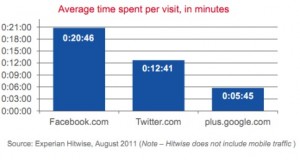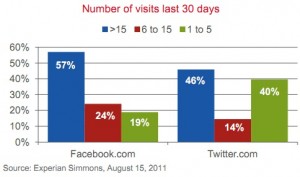
Promoting vs. Marketing a Book – The Promotion Stages – Pre-Publishing – Part 2 – Social Networks
Promoting vs. Marketing a Book – The Promotion Stages – Pre-Publishing – Part 2 – Social Networks
Back to part 1
c) Social Networks:
We will focus on Facebook and Twitter as these remain the leaders, at least for communication based on words. Google+ is still struggling to get off the ground and trailing far behind, and the jury is still out as to whether it will eventually take off or not.
The graphs below show the time spent on each network per visit as well as the average number of visits per day.
- Facebook: On Facebook, one can open a private profile, a page or a group. In theory, the private profile is for personal communication with friends and family, the page is for showcasing a business, or an author in this case, and a group is a place where people with a similar interest meet to hold discussions.
Ideally, an author will have a private profile, which is necessary to join a group, and a page, that “fans” can like without being approved. As a private individual, the author can join the discussions in the group and, every now and then, post a link to his page or his blog to raise awareness and bring more traffic or fans. Doing all this before having an actual book to sell removes the temptation to sell oneself and makes it much easier to build a community rather than being branded as a spammer due to over enthusiasm in peddling one’s book.
Again, the secret is to create a community trough listening, participating and bringing valuable information to the community so as to build a following that will be happy to buy the author’s book when it comes out.
This also means that the author needs to skillfully indicates every now and then that there is a book coming up from his pen and raise curiosity, for example by asking help in the appropriate groups or on the relevant pages in the following way: “My hero, Sockman, while on his quest for the Red Sock, got divided sideways between two universes. Is there a theory out there that might explain how I can reunite his two body halves?”
This is an unobtrusive way to a) introduce the hero, b) indicating that there is a quest involved in the book and c) that the book action takes place in multi-universes. As a bonus, there might even be a useful answer coming up, so it is all gain little pain.
On the other end of the spectrum, answering questions asked by other members of the community creates bonds, might lead to digital or even real friendship (depending on the location), and raises the author’s credibility. - Twitter: Twitter limits communication to 140 characters including spaces. So it is an ideal vehicle to post teasers leading followers to the author’s blog or to other articles of interest, where, of course, there are lots of fascinating posts that will keep the Twitter-wanderer coming back over and over for more.
Once again, the name of the game is to build a large faithful followership. Luckily, there are ways to automate much of the ground work.
Once the author has set up is profile, including an enticing bio that includes his main interest, it is time to get to work. The first step is to identify, through their bio, Tweeters with compatible interests, then follow them and hope they will follow back, mostly they do. Once they follow back, sending a welcome Direct Message (DM) increases the likelihood that they will pay attention to your tweets, favorite them or retweet them. To do all that manually is incredibly time consuming and tedious. Luckily, there are tools out there that enables automating part of the tasks.
Here are some that have been carefully selected and tried or currently being used by this blog.
Tools
Just unfollow : enables you to followback the people who followed you or to unfollow those who did not. The free tools limits the number of follow or unfollow one can do per day, and the paid version is a recurring fee. (used free version until signing up for TweetAdder, marginal benefit)
Buffer : enables you to schedule tweets ahead of time. The free version offers limited services, and the paid one has recurring fees that add up quickly. (used free version until signing up for TweetAdder, marginal benefit)
TweetAdder : Enables you to:
– identify tweeters according to various factors such as location, keywords from bio, number of followers and more
– Create list of relevant followers and automatically follow them
– Automatically unfollow tweeters who do not follow you back after an interval of time of your choice
– Schedule automated tweets
– Send automated “Thank You for Following” DMs with the text of your choice to all new followers. Tip, including a link to your Facebook page in the DM might raise the number of your fans – expect a ration of 1to 5% of send DM with a link to FB page to yield a new fan)
– retweet all tweets from selected tweeters
and more. One time fee, so no hidden costs. (currently used and saving up to 2 hours per day of performing tedious tasks. Traffic doubled withing 2 weeks of using services)
Triberr: a sort of cooperative system by which you join a tribe of tweeters with similar interests and retweet each other tweets. By invitation only. The service is free though there is the possibility of buying “bones” to unlock additional functions. (currently used, considerable traffic gain registered, please do not request invitations from here as only Tribe Chiefs can send invitations and blogger has not yet reach chief status)
Hashtags
Hashtags are keywords that can be included in your tweet preceded by the symbol # and that will give greater exposure to your tweets. Hashtagged tweets are recorded by curators of various paper.li and scoop.it publications that will choose to repost the link in your tweet as an article of their publications, thus expanding your reach as their publications are read by people who do not follow you on Twitter.
Useful hashtags for authors are:
#writegoal
#writequote
#writer
#writetip
#writing
#writingtips
#wrotetoday
#amediting
#amwriting
#author
#editing
#fictionfriday
#fridayflash
#nanowrimo
#Editorchat
#DNChat
#WLquotes
#WebFicWed
#pubtip
#publishing
#scifi
#selfpublishing
#epublish
#publishabook
#KDP (For Kindle Direct Publishing)
#bookdeal
#bookreview
This concludes the pre-publishing part of this series. Onto tips about the book launch tactics.
Sign up for our RSS Feed, our Facebook page or our Twitter anchor to make sure you don’t miss it

